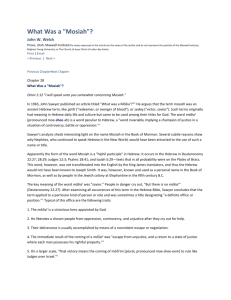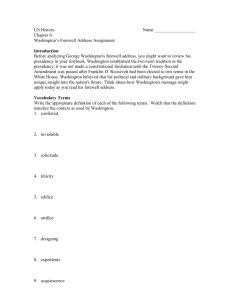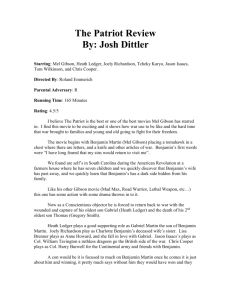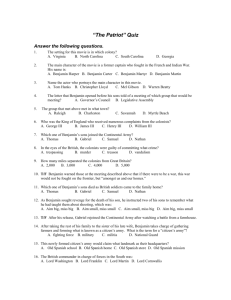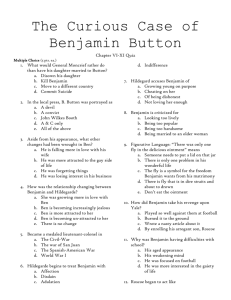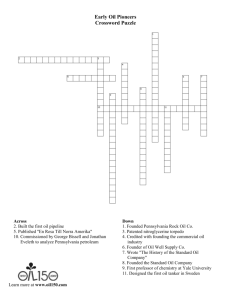BoM, King Benjamin's Speech
advertisement
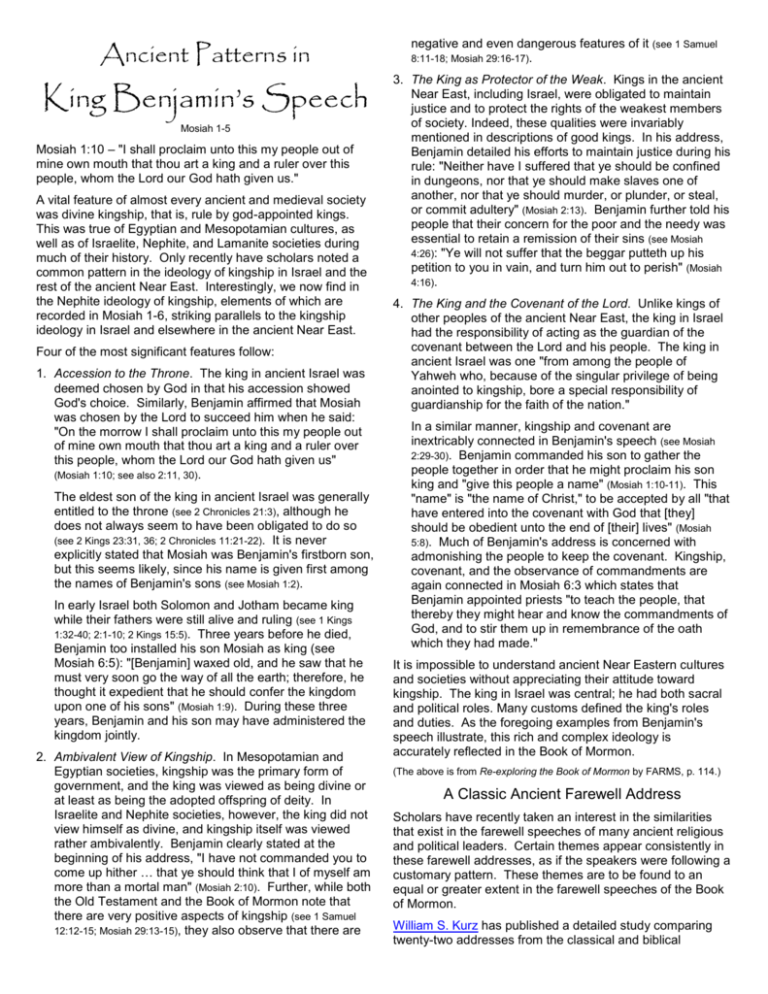
Ancient Patterns in negative and even dangerous features of it (see 1 Samuel 8:11-18; Mosiah 29:16-17). King Benjamin’s Speech 3. The King as Protector of the Weak. Kings in the ancient Near East, including Israel, were obligated to maintain justice and to protect the rights of the weakest members of society. Indeed, these qualities were invariably mentioned in descriptions of good kings. In his address, Benjamin detailed his efforts to maintain justice during his rule: "Neither have I suffered that ye should be confined in dungeons, nor that ye should make slaves one of another, nor that ye should murder, or plunder, or steal, or commit adultery" (Mosiah 2:13). Benjamin further told his people that their concern for the poor and the needy was essential to retain a remission of their sins (see Mosiah 4:26): "Ye will not suffer that the beggar putteth up his petition to you in vain, and turn him out to perish" (Mosiah 4:16). Mosiah 1-5 Mosiah 1:10 – "I shall proclaim unto this my people out of mine own mouth that thou art a king and a ruler over this people, whom the Lord our God hath given us." A vital feature of almost every ancient and medieval society was divine kingship, that is, rule by god-appointed kings. This was true of Egyptian and Mesopotamian cultures, as well as of Israelite, Nephite, and Lamanite societies during much of their history. Only recently have scholars noted a common pattern in the ideology of kingship in Israel and the rest of the ancient Near East. Interestingly, we now find in the Nephite ideology of kingship, elements of which are recorded in Mosiah 1-6, striking parallels to the kingship ideology in Israel and elsewhere in the ancient Near East. Four of the most significant features follow: 1. Accession to the Throne. The king in ancient Israel was deemed chosen by God in that his accession showed God's choice. Similarly, Benjamin affirmed that Mosiah was chosen by the Lord to succeed him when he said: "On the morrow I shall proclaim unto this my people out of mine own mouth that thou art a king and a ruler over this people, whom the Lord our God hath given us" (Mosiah 1:10; see also 2:11, 30). The eldest son of the king in ancient Israel was generally entitled to the throne (see 2 Chronicles 21:3), although he does not always seem to have been obligated to do so (see 2 Kings 23:31, 36; 2 Chronicles 11:21-22). It is never explicitly stated that Mosiah was Benjamin's firstborn son, but this seems likely, since his name is given first among the names of Benjamin's sons (see Mosiah 1:2). In early Israel both Solomon and Jotham became king while their fathers were still alive and ruling (see 1 Kings 1:32-40; 2:1-10; 2 Kings 15:5). Three years before he died, Benjamin too installed his son Mosiah as king (see Mosiah 6:5): "[Benjamin] waxed old, and he saw that he must very soon go the way of all the earth; therefore, he thought it expedient that he should confer the kingdom upon one of his sons" (Mosiah 1:9). During these three years, Benjamin and his son may have administered the kingdom jointly. 2. Ambivalent View of Kingship. In Mesopotamian and Egyptian societies, kingship was the primary form of government, and the king was viewed as being divine or at least as being the adopted offspring of deity. In Israelite and Nephite societies, however, the king did not view himself as divine, and kingship itself was viewed rather ambivalently. Benjamin clearly stated at the beginning of his address, "I have not commanded you to come up hither … that ye should think that I of myself am more than a mortal man" (Mosiah 2:10). Further, while both the Old Testament and the Book of Mormon note that there are very positive aspects of kingship (see 1 Samuel 12:12-15; Mosiah 29:13-15), they also observe that there are 4. The King and the Covenant of the Lord. Unlike kings of other peoples of the ancient Near East, the king in Israel had the responsibility of acting as the guardian of the covenant between the Lord and his people. The king in ancient Israel was one "from among the people of Yahweh who, because of the singular privilege of being anointed to kingship, bore a special responsibility of guardianship for the faith of the nation." In a similar manner, kingship and covenant are inextricably connected in Benjamin's speech (see Mosiah 2:29-30). Benjamin commanded his son to gather the people together in order that he might proclaim his son king and "give this people a name" (Mosiah 1:10-11). This "name" is "the name of Christ," to be accepted by all "that have entered into the covenant with God that [they] should be obedient unto the end of [their] lives" (Mosiah 5:8). Much of Benjamin's address is concerned with admonishing the people to keep the covenant. Kingship, covenant, and the observance of commandments are again connected in Mosiah 6:3 which states that Benjamin appointed priests "to teach the people, that thereby they might hear and know the commandments of God, and to stir them up in remembrance of the oath which they had made." It is impossible to understand ancient Near Eastern cultures and societies without appreciating their attitude toward kingship. The king in Israel was central; he had both sacral and political roles. Many customs defined the king's roles and duties. As the foregoing examples from Benjamin's speech illustrate, this rich and complex ideology is accurately reflected in the Book of Mormon. (The above is from Re-exploring the Book of Mormon by FARMS, p. 114.) A Classic Ancient Farewell Address Scholars have recently taken an interest in the similarities that exist in the farewell speeches of many ancient religious and political leaders. Certain themes appear consistently in these farewell addresses, as if the speakers were following a customary pattern. These themes are to be found to an equal or greater extent in the farewell speeches of the Book of Mormon. William S. Kurz has published a detailed study comparing twenty-two addresses from the classical and biblical traditions. ("Luke 22:14-38 and Greco-Roman and Biblical Farewell 10. He gives a theological review of history. (See 2:34-35; 3:13- Addresses,'' Journal of Biblical Literature 104 (1985): 251-68.) He has found that in Greco-Roman writings, the dying speaker, usually a philosopher or statesman, was concerned with suicide, the meaning of death, and life after death. However, in biblical farewell addresses, the speaker, typically a man of God, focused on God's plan, his people, and covenants, or on theological interpretations of history. While some elements are peculiar to one or the other tradition, Kurz has identified twenty elements common to the farewell addresses in general. Although Kurz knows no single speech that contains all of these elements, some contain more than others. Moses' farewell speech contains sixteen elements (see Deuteronomy 3134); Paul's, fourteen (see Acts 20); and Socrates', eleven. It is remarkable that King Benjamin's oration contains as many or more elements of the ancient farewell address than any of Kurz's examples. Unlike those other texts, Benjamin's speech was recorded in full and was precisely preserved. The report of Benjamin's address is not a paraphrase and is longer and more detailed than such addresses found in biblical accounts. Sixteen elements of the ideal ancient farewell address appear directly and others may be implied. Kurz signals four of his twenty elements as particularly common to Hebrew farewell addresses in the Old Testament and in the Old Testament Apocrypha: 1. 2. 3. 4. The speaker proposes tasks for successors, Reviews theological history, Reveals future events, and Declares his innocence and fulfillment of his mission. These elements all appear in the Benjamin account. Furthermore, the emphasis in Benjamin's address, as in the Israelite tradition, is on God's relationship to man, the speech ending with a covenant renewal. No trace of the Greco-Roman preoccupation with death occurs. Benjamin's speech thus fits illustriously into the Israelite tradition of farewell addresses. Recent research finds Benjamin's speech to be the most complete example of this speech typology yet found anywhere in world literature. It captures the essence of the traditional Israelite farewell sermon. By understanding this tradition, the Western mind can more deeply appreciate yet another dimension of the salutary words of King Benjamin. Kurz’s 20 Elements of Ancient Farewell Addresses (with references in Mosiah) 1. The speaker summons his successors. (See 1:9-10; 2:1, 9.) 2. He cites his own mission as an example. (See 2:12-14, 18.) 3. He states his innocence and the fact that he fulfilled his duty. (See 2:15, 27-31.) 4. He refers to his impending death. (See 1:9, 2:26, 28.) 5. He exhorts his audience. (See 2:9, 40-41; 4:9-10; 5:12.) 6. He issues warnings and final injunctions. (See 2:31-32, 3639; 3:12, 25; 4:14-30; 5:10-11.) 7. He blesses his audience. (Not clearly found, but see “blessed” in 2:41.) 8. He makes farewell gestures. (Possibly implied in 2:28; see 2 15.) 11. 12. 13. 14. 15. 16. 17. 18. 19. 20. The speaker reveals future events. (See 3:1, 5-10.) Promises are given. (See 2:22, 31; 4:12; 5:9.) He appoints / refers to successor. (See 1:15-16; 2:31; 6:3.) Rest of people bewail loss of leader. (Not found.) Future degeneration addressed. (See 3:23-27; 4:14-15.) Sacrifices and covenants are renewed. (See 2:3; 5:1-7.) Care is given for those left. (See 4:14-26; 6:3.) Consolation is given to inner circle. (See 5:15.) Didactic [moral teaching] speech is made. (See 3:16-21.) Ars moriendi [the art of dying well]. (Possibly in 2:28.) (The above s from Re-exploring the Book of Mormon by FARMS, p. 120.) Structure of the Speech (From Charting the Book of Mormon by FARMS, #87) PREPARATIONS (1:1–2:8, occurs before the first #A) – Successor named and new name to be given; people gathered but not yet numbered; tower constructed. A. All are indebted to God (2:9–28) – God is the heavenly king; God has physically created and sustains all people; people should serve and thank God; the hope of exaltation after death. FIRST INTERRUPTION (2:29–30) – Coronation proclamation. B. Consequences of obedience or disobedience (2:31– 41) – Obedience brings victory and prosperity (compare Leviticus 26); prohibition of contention; rebellion and disobedience bring pain and anguish; all are eternally indebted to Heavenly Father. SECOND INTERRUPTION (2:41–3:1) – Remember, remember, the Lord has spoken; Benjamin calls again for attention. C. The angel’s testimony of Christ’s deeds (3:2–10) – The Lord Omnipotent will come down in power and goodness; the sacred name of God; the suffering and death of Jesus Christ. D. Sanctification by the atonement of Christ (3:11–27) – The only possibility of reconciliation; putting off the natural man and becoming a saint; people will be judged according to their works. THIRD INTERRUPTION (3:27–4:4) – Thus has the Lord commanded, amen; the people fall to the ground and confess; atoning blood is applied; joy and remission; Benjamin begins to speak again. C'. Benjamin’s testimony of God’s goodness (4:4–12) – God is good, patient, long-suffering; believe in God; God is all-powerful, loving, and glorious; call upon the name of the Lord daily. B'. Righteous behavior of the redeemed (4:13–30) – Living in peace and social order (compare Leviticus 25); prohibition of contention; because God imparts, all must give to those in need; avoid guilt and sin. FOURTH INTERRUPTION (4:30–5:6) – Remember, and perish not; covenant response of the people; Benjamin accepts their covenant. A'. The sons and daughters of God (5:6–15) – God has spiritually begotten you this day; the only head to make you free from debt; excommunication upon breach of obligations; covenant people know. FINAL ACTS (6:1–3) – Names recorded of all who accepted the name; Mosiah consecrated; priests appointed; people dismissed. Nephi 9:44.) 9. He names tasks for his successors. (See 1:15-16; 2:31; 6:3.) (By Zan and Misty Larsen, www.elarsen.net/lessons) e. Ask the first student to read his or her passage. Then ask the class to decide which item it matched. Make sure that student voices his or her view. Presentation Notes This lesson focuses heavily on the structure of King Benjamin’s words. However it is possible that some students are not familiar with, or readily recall, the highlights of the speech itself such as “when ye are in the service of your fellow beings ye are only in the service of your God” (Mosiah 2:17). f. Note: Some of the passages are too obscure. Go through the form and bold the ones that are an easy, clear-cut match to a topic on the left. Assign only the bolded ones. Before handing out the sheet, a good activity would be to review the speech. A good way might be to ask the students to scan through the chapters (Mosiah 1-5), bring up the stand-out passages, and explain why they like them. As is usual with many of these lessons, the approach of using evidence of ancient patterns quickens the students’ conviction of the Book of Mormon. Less obvious is that the approach gets the students to look more closely at a section of scripture that may have previously seemed stale and worn out. The approach can leave a lasting appreciation and enthusiasm. Classroom activity: Do this before handing out the sheet. a. Using the last page of this document, write the 20 elements in order of 1-20. Number them. b. Write the 20 scriptures references in order of chapter and verse. Number them. c. Taking multiple rounds, assign each a passage to each student. d. Take a moment for students to look up and read their passages. Continue student by student through the round and then assign the next set of passages for the next round. Extra Material Get extracts from these chapters in Reexploring the Book of Mormon , chapters 28 and 31-35.– What Was a "Mosiah"? The Ideology of Kingship in Mosiah 1-6 "This Day" Benjamin's Speech: A Classic Ancient Farewell Address (used in this handout) The Coronation of Kings "O Man, Remember, and Perish Not" (Mosiah 4:30) Overview of Benjamin’s Speech – Mosiah 1–6 A. All are indebted to God (2:9–28) God is the heavenly king; God has physically created and sustains all people; people should serve and thank God; the hope of exaltation after death Preparations (1:1–2:8) Successor named and new name to be given; people gathered but not yet numbered; tower constructed B. Consequences of obedience or disobedience (2:31–41) Obedience brings victory and prosperity (compare Leviticus 26); prohibition of contention; rebellion and disobedience bring pain and anguish; all are eternally indebted to Heavenly Father First Interruption (2:29–30) Coronation proclamation C. The angel’s testimony of Christ’s deeds (3:2–10) The Lord Omnipotent will come down in power and goodness; the sacred name of God; the suffering and death of Jesus Christ Second Interruption (2:41–3:1) Remember, remember, the Lord has spoken; Benjamin calls again for attention D. Sanctification by the atonement of Christ (3:11–27) The only possibility of reconciliation; putting off the natural man and becoming a saint; people will be judged according to their works C'. Benjamin’s testimony of God’s goodness (4:4–12) God is good, patient, long-suffering; believe in God; God is all-powerful, loving, and glorious; call upon the name of the Lord daily B'. Righteous behavior of the redeemed (4:13–30) Living in peace and social order (compare Leviticus 25); prohibition of contention; because God imparts, all must give to those in need; avoid guilt and sin A'. The sons and daughters of God (5:6–15) God has spiritually begotten you this day; the only head to make you free from debt; excommunication upon breach of obligations; covenant people know Third Interruption (3:27–4:4) Thus has the Lord commanded, amen; the people fall to the ground and confess; atoning blood is applied; joy and remission; Benjamin begins to speak again Fourth Interruption (4:30–5:6) Remember, and perish not; covenant response of the people; Benjamin accepts their covenant Final Acts (6:1–3) Names recorded of all who accepted the name; Mosiah consecrated; priests appointed; people dismissed Kurz’s 20 Elements – Teacher’s copy No. 1 2 3 4 5 6 7 8 9 10 11 12 13 14 15 16 17 18 19 20 Element The speaker summons his successors. He cites his own mission as an example. He states his innocence and the fact that he fulfilled his duty. He refers to his impending death. He exhorts his audience. He issues warnings and final injunctions. He blesses his audience. He makes farewell gestures. He names tasks for his successors. He gives a theological review of history. The speaker reveals future events. Promises are given. He appoints / refers to successor. Rest of people bewail loss of leader. Future degeneration addressed. Sacrifices and covenants are renewed. Care is given for those left. Consolation is given to inner circle. Didactic [moral teaching] speech is made. Ars moriendi [the art of dying well]. Passage in Mosiah 2:1-2 2:12-13, 18 2:15, 27-28 2:26 2:9 2:36, 38-39 2:41 "blessed” 2:28 (possibly) 1:15-16 2:34-35 3:1, skim 5-10. 2:31; 6:3 Not found. 3:24-25 2:3; 5:5. 4:15-16 5:15 (too general) 3:16-21 (too general). 2:28 (possibly, already used). Kurz’s 20 Elements of Ancient Farewell Addresses Match the bolded passages in Mosiah on the right to the element on the left. No. Element Passage 1. The speaker summons his successors. A. 1:15-16 2. He cites his own mission as an example. B. 2:1-2 3. He states his innocence and the fact that he fulfilled his duty. C. 2:12-13, 18 4. He refers to his impending death. D. 2:15, 27-28 5. He exhorts his audience. E. 2:26 6. He issues warnings and final injunctions. F. 2:31 7. He blesses his audience. G. 2:34-35 8. He makes farewell gestures. H. 2:36, 38-39 9. He names tasks for his successors. I. 2:3; 5:5 10. He gives a theological review of history. J. 2:41 ("blessed”) 11. The speaker reveals future events. K. 2:9 12. Promises are given. L. 3:1 (skim 5-10) 13. He appoints / refers to successor. M. 3:24-25 14. The rest of people bewail loss of leader. (not found in Mosiah) N. 4:15-16 15. Future degeneration addressed. O. 6:3 16. Sacrifices and covenants are renewed. P. 2:28 17. Care is given for those left. Q. 5:15 18. Consolation is given to inner circle. R. 3:16-21 19. Didactic [moral teaching] speech is made. S. 2:28 20. Ars moriendi [the art of dying well]. Kurz’s 20 Elements of Ancient Farewell Addresses Match the bolded passages in Mosiah on the right to the element on the left. No. Element Passage 1. The speaker summons his successors. A. 1:15-16 2. He cites his own mission as an example. B. 2:1-2 3. He states his innocence and the fact that he fulfilled his duty. C. 2:12-13, 18 4. He refers to his impending death. D. 2:15, 27-28 5. He exhorts his audience. E. 2:26 6. He issues warnings and final injunctions. F. 2:31 7. He blesses his audience. G. 2:34-35 8. He makes farewell gestures. H. 2:36, 38-39 9. He names tasks for his successors. I. 2:3; 5:5 10. He gives a theological review of history. J. 2:41 ("blessed”) 11. The speaker reveals future events. K. 2:9 12. Promises are given. L. 3:1 (skim 5-10) 13. He appoints / refers to successor. M. 3:24-25 14. The rest of people bewail loss of leader. (not found in Mosiah) N. 4:15-16 15. Future degeneration addressed. O. 6:3 16. Sacrifices and covenants are renewed. P. 2:28 17. Care is given for those left. Q. 5:15 18. Consolation is given to inner circle. R. 3:16-21 19. Didactic [moral teaching] speech is made. S. 2:28 20. Ars moriendi [the art of dying well].
